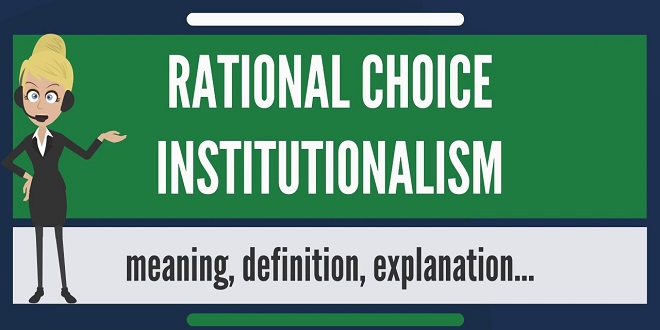What is psychoanalysis rational choice and institutionalism

The research program of rational choice institutionalism is founded on abstraction, simplification, analytical rigor, and an insistence on clean lines of analysis from basic axioms to analytical propositions to empirical implications. Much of the research in this program actually practices what it preaches! Self-conscious and 14 Even earlier, Hardin 1971 noted the connection between Olson’s collective action problem and an in-person version of the PD
Bounded Rationality
Initiated in the early work of Herbert Simon, though also associated closely with the work of the social psychologist Sidney Siegel, bounded rationality takes the perspective that being rational is costly on the one hand, and is constrained by cognitive limitations on the other.16 Consequently, real human beings, in contrast to automatons, are only approximately rational.
Their behavior reveals levels of aspiration, rules of thumb, standing decisions, stopping rules, and satisfaction. At times boundedly rational behavior can be shown to be identical to canonical rational behavior under uncertainty and costly decision-making, so it is not a radical departure from the canonical program. But it has loosened the strictures and thus paved the way for a second, more recent development
Behavioral Economics
This branch of rational choice examines what happens in markets and Wrms when individual agents are cognitively constrained. Perhaps the most influential work in this area was stimulated by the ground-breaking research of two psychologists, Daniel Kahneman and Amos Tversky. The emphasis here is on rationality qualified by psychological limitations loss aversion, framing effects, 16 A recent elaboration of this approach that brings attention to the relevance of the work of modern cognitive science for democratic theory is Lupia and McCubbins 1998. A broad interpretive essay on this same subject by Goodin 2000a is well worth consulting
Transaction-cost Economics
This work has its origins in the seminal contributions of Ronald Coase (1937, 1960) and applications of his ideas (along with those of students of bounded rationality) by Oliver Williamson (1985). In this work, the fundamental unit of analysis is the transaction and the fundamental institution of transactions is the contract. Emphasis is focused on the costliness of searching for transaction partners, drafting agreements, anticipating contingencies of relevance to the agreement, devising mechanisms to interpret agreements in novel circumstances, policing and enforcing compliance, and dealing with transgressions. Exchange, in short, is neither automatic nor cost-free
Analytical Narratives
A Wall blurring of distinctions attacks the line between rational choice institutionalism and historical institutionalism. Separately and collectively, Robert Bates, Avner Greif, Margaret Levi, Jean-Laurent Rosenthal, and Barry Weingast, have developed the analytical narrative as a case-oriented methodology for studying institutional development in a historical context (Bates et al. 1998). The object of analysis is a historical case—economic growth in medieval Italian city-states, conscription, the institutional origins of the American civil war, the coffee cartel in Latin America, the historical evolution of European absolutist regimes. What distinguishes this approach from mainstream historical institutionalism is the use of analytical models—a spatial representation, a game form, an optimization set-up—as a framework in which to embed the case





